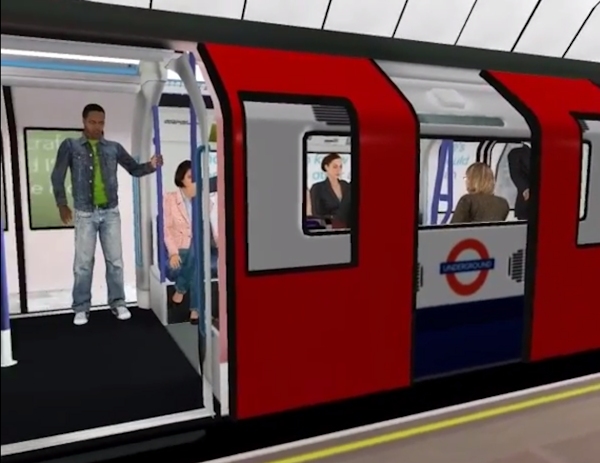[From Motherboard]
A Virtual Reality Train Ride Reveals a Link Between Height and Paranoia
By Victoria Turk
January 29, 2014
As anyone who’s been to a gig and isn’t six feet tall has probably experienced, being surrounded by people taller than you—why does that always happen?—can be annoying at best, and kind of scary at worst. There’s a certain vulnerability that comes with suddenly feeling shorter than those around you. A paper published online today in the journal Psychiatry Research looks at part of this phenomenon, by investigating the relation between height and paranoia.
The study, which was led by researchers at Oxford University and funded by the Medical Research Council, found that being shorter made people feel more mistrustful of those around them. They came to this conclusion after a virtual reality experiment in which participants took two virtual rides on the London Underground; one at their own height, and one with their height artificially reduced by 25cm (about a head). They weren’t told that their line of sight had been lowered until after the study.
The study participants experienced the tube ride through a head-mounted display, but you can get a feel for the simulation from this [1:36 minute] video.
The reason height was interesting to the researchers is because in the past it’s been found to be an important social cue. “Height is a marker of social status and authority,” the authors wrote. They cited studies that showed “taller people are more likely to have achieved higher educational attainment, hold jobs of higher status, have higher social esteem, earn more, and report higher levels of well-being.”
So what they were really looking for was a link between people’s perceived social position and how that affected their feelings about people around them, using height as a proxy for social rank.
It’s worth noting here that the study was conducted with 60 female participants—so we don’t know if the same results would be found in men—and that they had all reported paranoid thinking in the past month, so were prone to mistrustful thoughts.
Most of the participants didn’t notice their height had been adjusted for one of the virtual train rides, but did report feeling more paranoid. In a questionnaire after the experiment, they scored their “social comparison” (i.e. where they saw themselves in the social pecking order) lower, and paranoia higher.
The paper quotes a few comments by the women, such as one who said, “It felt different in the two times. I felt more vulnerable the first time [lowered condition], and also the man with the legs in the aisle was acting in a hostile way towards me the first time, but I didn’t feel it so much the second time, even though his legs were in the same place, I don’t know why!”
In fact, the avatar commuters in the virtual reality world were programmed to respond in the same manner both times; they would take the same time to return the participant’s gaze, and also look away after a set amount of time.
Of course, the study doesn’t necessarily mean that short people are more paranoid, as certain stereotypes might suggest. It’s about feeling short, not being short. As the women’s height was lowered in one of the tests, the change in height rather than the actual measurement could be the cause of their vulnerable feelings—it stands to reason that naturally short people might not have the same response.
The researchers concluded, however, that paranoia is linked to how you feel about yourself. “It provides a key insight into paranoia, showing that people’s excessive mistrust of others directly builds upon their own negative feelings about themselves,” said Daniel Freeman, who led the study.
The next step is to see if increasing people’s height in virtuality has the opposite effect, and boosts their self-esteem while reducing paranoid thoughts.
In this way, the researchers hope their findings could lead to another promising application of using virtual reality to treat mental illness. “The important treatment implication for severe paranoia that we can take from this study … is that if we help people to feel more self-confident then they will be less mistrustful,” Freeman continued. “This prediction is exactly what we are testing in the next phase of our work, a new randomised controlled clinical trial.”
